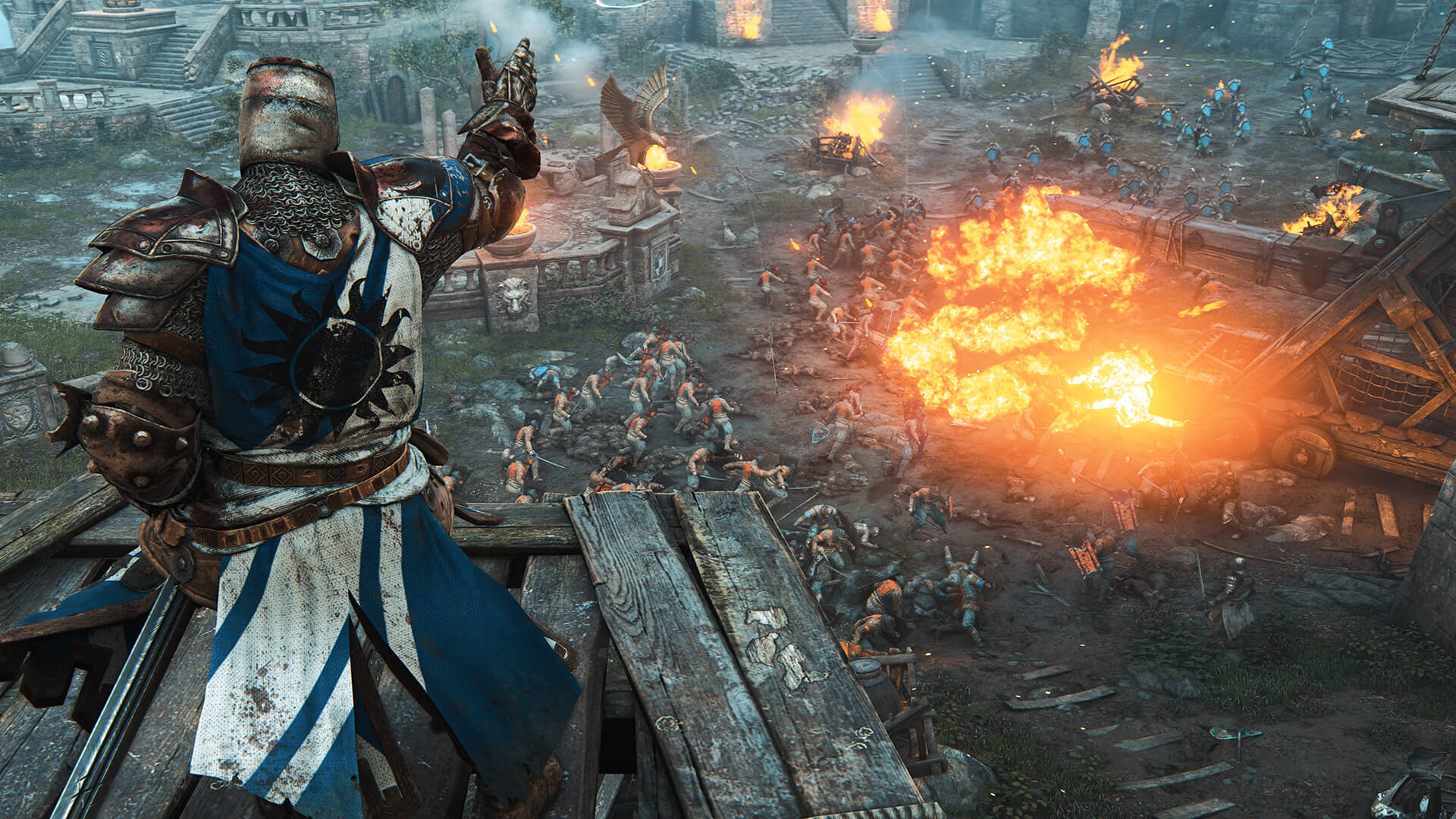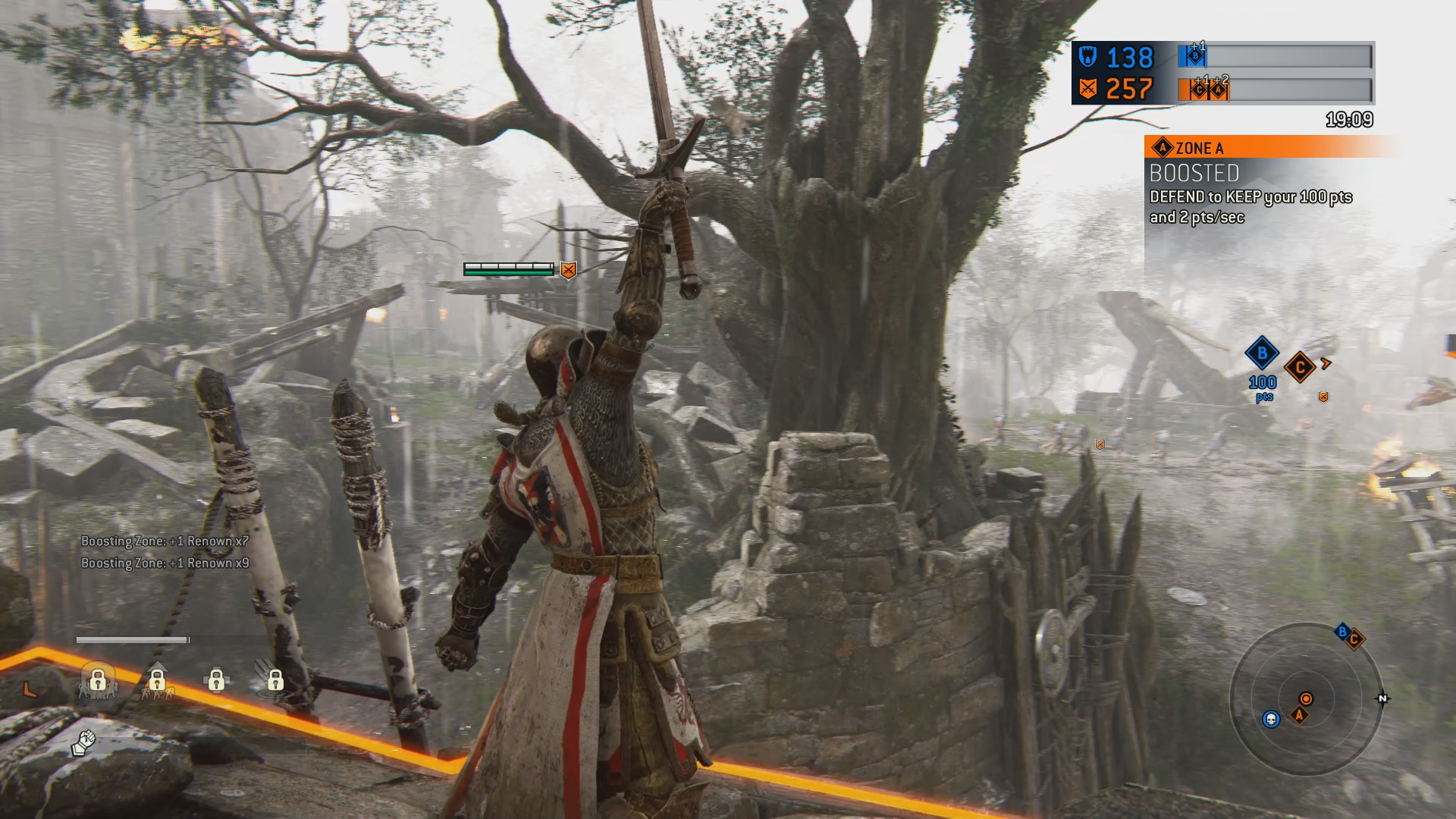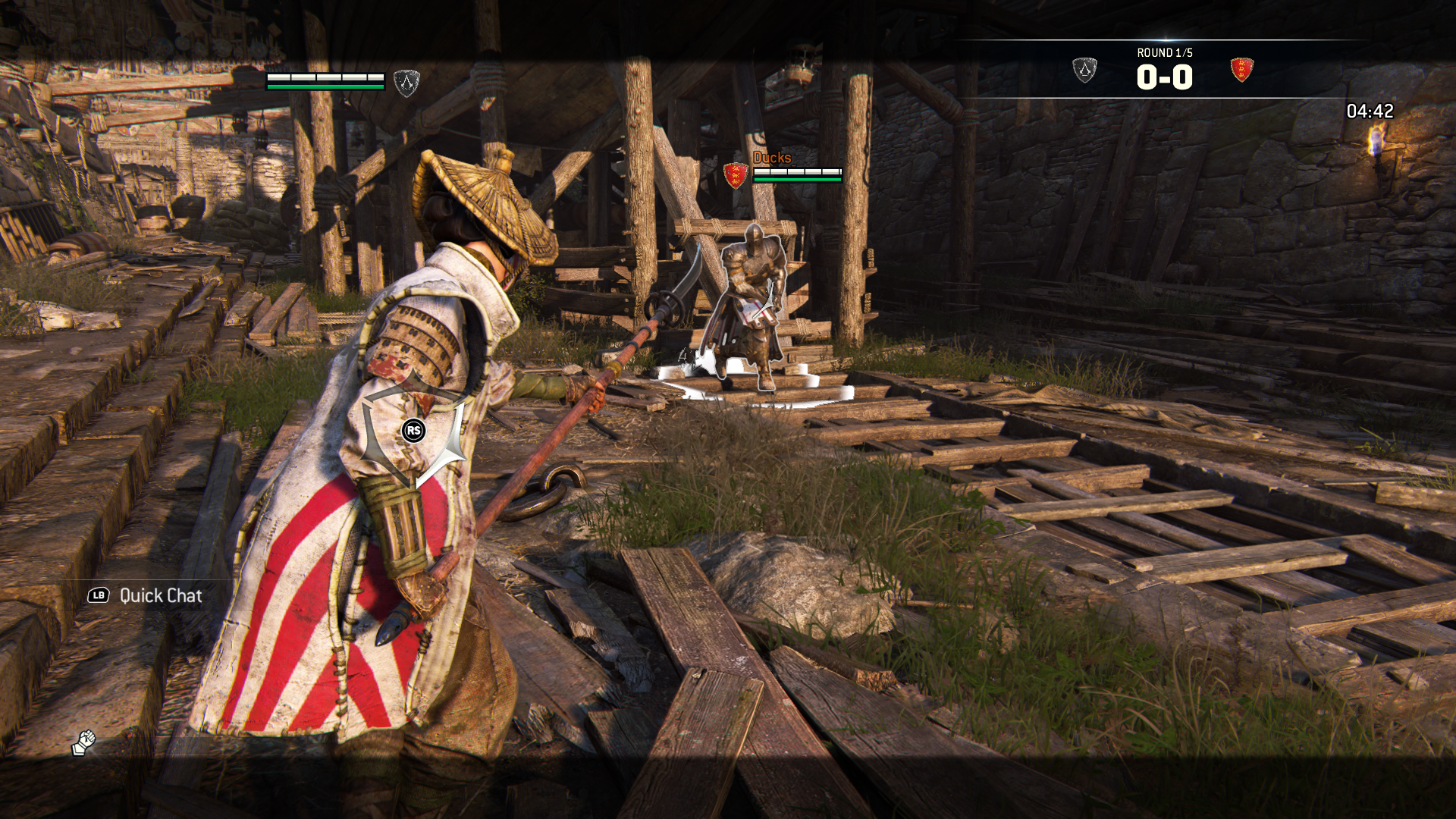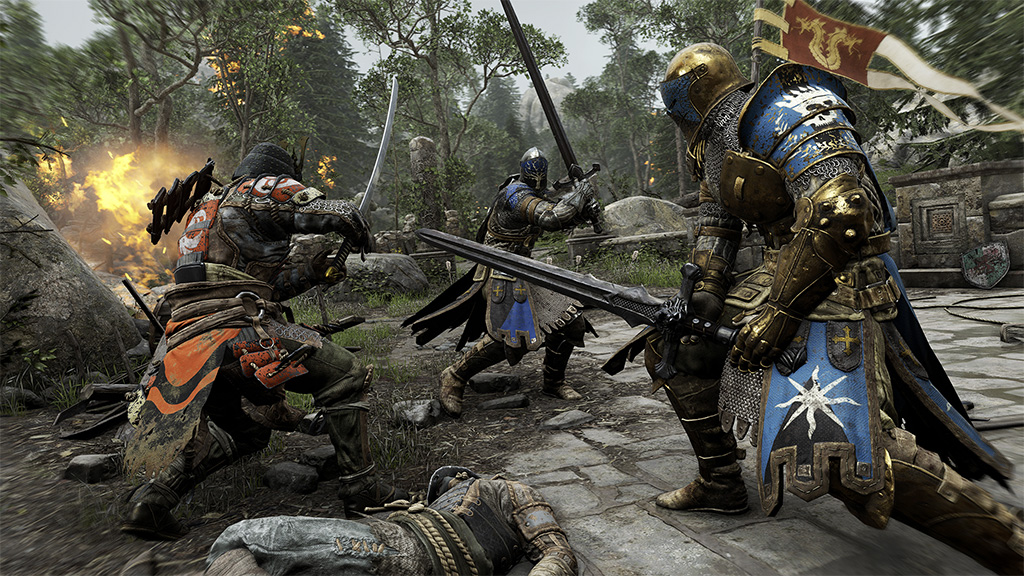The rise and fall of For Honor
Looking back at Ubisoft's four-on-four brawler and what went wrong.

For Honor clearly leans upon the success of Rainbow Six Siege—a highly competitive multiplayer game focused on individual characters and their unique abilities. But while Rainbow Six Siege has grown into one of the healthiest competitive shooters of recent years, For Honor has struggled to find any traction since launching in February. Dropping from over 25,000 concurrent players on Steam to just a few thousand, things aren't looking great. But with both games sharing so much DNA—hell, even their season passes are structured almost exactly the same way—where did For Honor go wrong?
In the beginning there were three
For Honor was originally announced during E3 2015. When Jason VandenBerghe, For Honor's original creative director, took the stage, he spoke at length about the "Art of Battle," a new type of gameplay where "you can feel the weight of the weapon in your hand, the crash as you block the attack, and the impact as you strike the winning blow."
Clearly an evolution of directional-based combat systems from games like Chivalry and Mount & Blade, For Honor felt more like a fighting game with its emphasis on combos and chip attacks. Instead of having symmetrical character classes across each of its three factions, For Honor introduced individual classes unique to their faction. Likewise, its multiplayer debut led many to believe that, like Siege, For Honor might skip the singleplayer campaign. When Wes first played it during E3, he was "sold on the combat’s heft and heat-of-the-moment tension."
It was a strong debut, and For Honor racked up over 20 Best Of E3 nominations. For about a seven months, Ubisoft didn't have much to say about its development until it revealed that For Honor would have a singleplayer campaign, and, later, that it would release in 2017. And that's when things seemed to start going downhill.
Always online and peer-to-peer
In December of 2016, many were disappointed after finding out more specifics of For Honor's online matchmaking. During a closed alpha test, one player broke their non-disclosure agreement to share a video showing For Honor's peer-to-peer (p2p) matchmaking and the internet collectively groaned in agony. While it's common for fighting games to use p2p networking, many worried that For Honor's eight-player matches would end up being lag-fests if the one player hosting had an unstable connection. The news exploded on the r/games subreddit, with many commenters lambasting Ubisoft for not using dedicated servers to host its multiplayer matches.
Even a small amount of lag can ruin a fight, as seen in the Souls games or Chivalry...
Vaeh
"As a game primarily featuring close combat, For Honor absolutely needs robust and incredibly accurate netcode," wrote Vaeh on Reddit. "Even a small amount of lag can ruin a fight, as seen in the Souls games or Chivalry (amongst others)."
Days later, people had another reason to groan: For Honor would be require you to always be online while playing—even during the singleplayer campaign. Ubisoft defended the decision saying that the progression system that tied single and multiplayer together needed to be hosted online.
The biggest gaming news, reviews and hardware deals
Keep up to date with the most important stories and the best deals, as picked by the PC Gamer team.
"Even though we're getting used to this kind of nonsense it has to be frustrating for people with poor or intermittent connections," Andy wrote in our coverage of the news. "Or even just as a matter of principle: Why do I need to be connected if I'm playing solo?"
Despite these concerns, For Honor ended up attracting 1.8 million PC players during its open beta weeks before launch, the most popular beta Ubisoft had seen at the time. Across every platform, the For Honor beta saw six million people dueling each other. But it wasn't until For Honor released that fears over its p2p networking came true. And players encountered an equally as frustrating problem: For Honor's aggressive microtransactions.

Peer into the future
For Honor's launch was, by all accounts, a big success. Andy gave it a 74 in our review, praising the combat and strategy while criticizing the needlessly bloated progression system and free-to-play style microtransactions. Despite the concerns over its p2p networking, For Honor attracted over 25,000 concurrent players on Steam during its first day, proving to be more popular than Rainbow Six Siege by a decent margin. But it wouldn't last.
During the first few weeks after For Honor released, players' worst fears about its p2p were realized. As Eurogamer reported, many players encountered significant issues with For Honor and it wasn't just the usual case of servers straining under the initial rush of excited players.
One of the weaknesses of p2p setups is that one player hosts the game for every other player, often giving them an advantage due to natural network latency. For Honor circumvented this problem by having players connect to every other player instead of to a single host. But the moment someone quit a match, the action would pause for everyone while the system reconfigured the connection. And For Honor was full of ragequitters.
Compounded with the long queues and instability, many players could not reliably connect to a game. "I'd say one in four matches ends with a disconnection error, booting me back to the game menu," wrote Wesley Yin-Poole over at Eurogamer. "This can be particularly aggravating when you've spent five minutes getting into a game, only for it to collapse after just a few seconds."
Steel yourselves
As players trudged through the complications of For Honor's matchmaking, another major problem began to irritate its community: aggressive microtransactions. In March, Reddit user bystander007 crunched the numbers and discovered that if you were to grind for an hour or two every day, it would take two and a half years to unlock every hero and every cosmetic item (excluding DLC heroes). On top of the $60 price tag, it would cost players an additional $732 to unlock every item available in the base game. No one was happy about that.
Part of the problem, as Prime_Ribber explained on Reddit at the time, was that For Honor's unlocks weren't purely cosmetic either. In its 4v4 game mode, gear has stats that impact your warrior's abilities and overall strength. "People compare this to Overwatch in an effort to justify its shitty microtransactions, but Overwatch only ever has cosmetic items," they write. "Lootboxes come in pretty reasonably through leveling up and weekly arcade wins, whereas For Honor requires a lot of grind for gear to even to remain competitive in 4v4 game modes."
For Honor requires a lot of grind for gear to even to remain competitive in 4v4 game modes.
Prime_Ribber
For Honor's steep progression system led to Ubisoft having to ban 1,500 players who were AFK farming its in-game currency. Days later, overwhelming pressure from the community forced Ubisoft to address the complaints. During a livestream, game director Damien Kieken had this to say: "We never had an intention for you to unlock everything in the game. First, that doesn't truly make any sense. We applied RPG mechanics on top of a fighting game, in a PVP environment, but it's like in an RPG, like in World of Warcraft: you would never try to unlock everything for all the characters of the whole game. Same for any MOBA, you're not trying to unlock all the content for all the characters in the game."
But that wasn't what the community wanted to hear.

Rally the troops
By this point, it was clear a rift was forming between Ubisoft and its community. For Honor's daily concurrent users had dropped to just under 7,000 and the community forums and subreddit became full of complaints about the direction the game was headed. With persistent networking issues, aggressive microtransactions, and long-standing complaints of game balance, people were fed up. It was time to send a message.
On March 29, Reddit user jbaayoun rallied the For Honor community and called for a boycott until Ubisoft responded to their list of complaints. "The goal is to receive a response from Ubisoft, something that tells us to maintain our faith in the game," jbaayoun wrote. "Below is a list of reasonable requests and suggestions made by the community that I have noticed. I hope together we can make a difference in the game we love."
Chief among those requests was better communication from the For Honor development team. Just over a month after launch, players had little idea of Ubisoft's plans for the future. Likewise, their response to issues like network instability were vague and uninformative and For Honor's shrinking playerbase wanted more transparency.
The boycott was scheduled to begin on April 3, but a day after jbaayoun's post exploded across the For Honor community, Ubisoft responded. A hotfix was released that dramatically increased the rates that players could earn in-game currency and Ubisoft announced a weekly livestream with its developers that would hopefully shed light on the community's biggest issues.
[Ubisoft] have shown us that they are truly listening and want this game to last.
jbaayoun
During that first weekly livestream, producer Stéphane Cardin and game directors Damien Kieken and Roman Campos-Oriola laid out a detailed roadmap that included balance changes to For Honor's most overpowered classes, plans to punish ragequitters, and more. The swift response from Ubisoft was admirable, and the community took note.
Following the livestream, jbaayoun and other members of the community called off the blackout. "For the most part our requests and suggestions that have been posted in my thread and similar threads have been met," jbaayoun wrote. "Although the Steel [the in-game currency] may not be enough for many and we are still unaware of the details of matchmaking, we have received our goal. We are receiving the balance changes we want in the near future, we have a small solution to our steel problem, they have come up with a new form of weekly communication and they have shown us that they are truly listening and want this game to last."

All quiet on the western front
In the weeks following the proposed boycott, the frustration of For Honor players seemed to quiet. Ubisoft worked with the community to make balance tweaks to certain heroes and continued to release patches that improved the matchmaking stability.
In July, Ubisoft announced that For Honor would finally get dedicated servers but it would take significant time to make the change. "We saw that we had connectivity and stability problems, mostly on 4v4 modes, so it’s one of the things we’ve looked at and worked on a lot since the game launched. And during that process, we decided to do an analysis of the whole online infrastructure we have and compare it to other existing ones," Kieken said. "And in the end, based on all the data we gathered … we decided to do the move and to migrate to a dedicated server technology."
Kieken likened the shift to dedicated servers like "changing the engine of a car while it runs," and wouldn't give an estimated timeframe. But with a roadmap already laid out for 2017, it appears the change could be as far off as 2018. While many are relieved to hear Ubisoft is willing to go the distance to fixing For Honor's biggest problem, it is possible the change could come too late. By the end of July, For Honor's daily users on Steam was just 1,500—a drop of nearly 95 percent.
I'd say one in four matches ends with a disconnection error, booting me back to the game menu.
Wesley Yin-Poole
Still, things seemed to be looking up for the small community until last week when Ubisoft hosted a tournament that ended in controversy, reigniting old frustrations for many players. During the tournament, longstanding glitches and balance issues were given the spotlight. During one crucial match, a player lost because of a well-known glitch that can cause characters to fall over when fighting on an incline.
But the real source of frustration came when the tournament champion took home the grand prize of $10,000 by shamelessly abusing an exploit. "I didn't think it'd be this easy," said Jakub 'SB.Alernakin' Palen after he claimed his prize. "Before the tournament, I hadn’t played the game for two weeks."
Palen won using an exploit that the community had complained about for months. By unlocking his target at just the right moment during an attack, his sword swings would become unblockable. Instead of disqualifying him, Ubisoft treated Palen's exploit abuse flippantly.
Multiple posts over on the For Honor subreddit criticized the tournament as "a disgrace" and "shameful."
The future
Despite all the problems that For Honor has had since launch, it's still got a healthy community of players across every platform. The subreddit enjoys a larger number of concurrent users than those playing on Steam, but it's hard not to feel like the damage has already been done.
For Honor and Rainbow Six Siege have shared similar paths, but Siege's issues were never as dire. At its lowest, Siege still had 11,000 players on Steam and, to date, sees roughly 100,000 concurrent players daily. For Honor, on the other hand, has closer to 5,000 people playing. Though they share a similar DNA and, likewise, similar growing pains, For Honor has a much bigger mountain to climb if it wants to be a game that players are happily playing years from now. Ubisoft is obviously beginning to listen and take measures to save the game, but it might already be too late.
With over 7 years of experience with in-depth feature reporting, Steven's mission is to chronicle the fascinating ways that games intersect our lives. Whether it's colossal in-game wars in an MMO, or long-haul truckers who turn to games to protect them from the loneliness of the open road, Steven tries to unearth PC gaming's greatest untold stories. His love of PC gaming started extremely early. Without money to spend, he spent an entire day watching the progress bar on a 25mb download of the Heroes of Might and Magic 2 demo that he then played for at least a hundred hours. It was a good demo.


